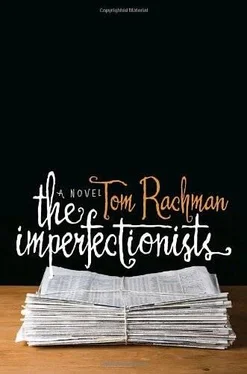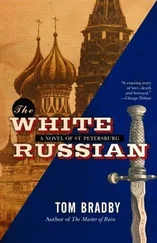The three of them got along splendidly. Indeed, the only awkward moments arose when Ott stepped away, at which point Betty and Leo spoke to each other as if newly introduced and watched the door for their publisher to return.
Normally, Ott was ruthless about profit. But the paper was an anomaly: financially, it stank. Back in the United States, his business rivals observed this Italian venture with suspicion. It must be a scheme of sorts, they figured.
If so, the aim was far from clear.
He never explained his business plans to Betty and Leo, and was even more opaque on personal matters. He had a wife, Jeanne, and a young son, Boyd, but had never explained why they remained in Atlanta. Leo sought to tease out details but failed-Ott had the ability to insert full stops in conversations, when and where he wished them.
"EUROPEANS ARE LAZY, STUDY SAYS"
BUSINESS REPORTER-HARDY BENJAMIN
HARDY SPENDS HER MORNING ON THE PHONE TO LONDON, PARIS, and Frankfurt, wheedling quotes from grumpy financial analysts. "Is an interest-rate hike imminent?" she asks. "Is Brussels extending the shoe tariffs? What about the trade imbalance?"
She is unfailingly courteous even when her sources are not.
"Hardy, I'm busy. What do you need?"
"I could call back later."
"I'm busy now; I'm busier later."
"Sorry to be so annoying. Just wondering if you got my voice mail."
"Yes, I know-you're doing another China story."
"I'll be quick, I swear."
"You know my line on China: 'We should all start learning Mandarin. Blah-blah-blah.' Can I go now?"
By midafternoon she has written a thousand words, which is greater than the number of calories she has consumed since yesterday. Hardy is on a diet that started, roughly, at age twelve. She's thirty-six now and still dreaming of butter cookies.
She takes a break at the espresso bar downstairs, where she meets up with her friend Annika, who is unemployed and therefore usually free for coffee. Hardy empties a packet of artificial sweetener over her cappuccino. "Nothing epitomizes the futility of human striving quite like aspartame," she says and sips. "Ah, but this is good."
Meanwhile, Annika floods her caffe macchiato with an endless stream of brown sugar.
They are an unusual duo at the bar: one is pinkish, geeky, short (Hardy); the other is bosomy, stylish, tall (Annika). The pinkish one waves for the barman, but he doesn't notice; the bosomy one nods and he bolts forward.
"You're annoyingly good at hailing boys," Hardy says. "Though it's demeaning how they slobber over you."
"It doesn't demean me."
"It demeans me. I want counter staff to treat me like an object," she says. "Did I tell you, by the way, that I had another nightmare about my hair?"
Annika smiles. "You're sick, Hardy."
"In my dream, I was looking in the mirror and I saw this apparition blinking back at me, surrounded by orange frizz. Horrifying." She glimpses herself in the mirror behind the bar and turns from the sight. "Grotesque."
"For the record," Annika says, "I adore your hair." She pulls one of Hardy's curls. "Look how it boings back. And I love auburn."
"Auburn?" she says, eyebrows raised. "My hair is auburn like carrot soup is auburn." Her cellphone rings, and she drains the last sip of cappuccino. "It's gonna be Kathleen with questions on my story." Hardy assumes her professional voice and answers. But after listening a moment her tone changes to alarm. She responds in Italian, copies down an address, and hangs up. "It was the police," she tells Annika. "My apartment was burglarized. Apparently, they caught a couple of punkabbestia druggies coming out with all my stuff."
Back home, she finds the drawers flung open and food dumped on the floor. In place of her mini stereo and tiny flat-screen TV are wires. Thankfully, her laptop was at the office. Her apartment is on the ground floor and the kitchen window, which gives onto an alley, has been smashed. That's where they entered, the police say. Apparently, the two suspects stuffed all they could into plastic bags, then fled. But the bags-already jammed with stolen goods from another apartment in Trastevere-tore under the weight and disgorged loot all over the roadway outside. The culprits tried to stuff the swag back in, but the commotion attracted the authorities.
On a long table at the police station are strewn her CDs, mini stereo, little flat-screen TV, DVDs, perfume, and jewelry, mixed with the possessions of the other, absent victim: a nylon necktie circa 1961, a handful of spy thrillers in English, a Catholic catechism, and, strangely, a pile of ratty boxer shorts.
She states for the record that her belongings are among those recovered, but is not allowed to retrieve anything-the other victim must be present to avoid disputes over ownership, and the police cannot find him.
That night, Hardy phones Annika to coax her over. "It's creepy with the window smashed," Hardy says. "You don't want to come and protect me? I'll cook."
"I wish I could, but I'm still waiting for my fella to get home," Annika says, meaning Craig Menzies, the paper's news editor. "You could always come hang out with us."
"I don't want to go overboard. It's fine."
Hardy checks the deadbolt and settles on the couch, blanket laid over her legs, feet snuggled beneath, a carving knife within reach. She gets up and checks the lock again. As she passes the mirror, she raises a hand to block the sight of herself.
She inspects the window in the kitchen-air rushes under the cardboard that patches over the shattered pane. She prods the card. It holds, but is hardly safe. She nestles under the blanket and opens her book. After eighty pages-she's a fast reader-she gets up to investigate what's available in the kitchen for dinner. She settles on rice crackers and a can of chicken broth on the top shelf, which she is too short to reach. Using a ladle, she taps the can to the edge. It wobbles, falls, and she catches it with her free hand. "I'm a genius," she says.
Days pass and the police cannot find the other victim, which means that Hardy is still forbidden to reclaim her possessions.
"At the start," she complains to Annika, "I imagined this guy as some kind of sweet, innocent English monk, with the spy thrillers and the catechism and all that. But I'm starting to hate him. I have this image now of some pervert priest, you know, with the cilice and the drooling problem, hiding out at some pontifical institute to avoid criminal charges in the States. Regrettably, I've seen the man's boxers."
Almost two weeks later, the police locate him. By the time she arrives at the station, he's already sorting through their stuff. She turns angrily to a policeman. "I can't believe you didn't wait for me," she says in Italian. "The whole point was for me and him to divide up the stuff together."
The officer melts away and the other victim turns cheerfully toward her. He's not a priest, after all, but a scruffy twentysomething with blond dreadlocks. "Buongiorno!" he says, conveying in one word his utter inability with the language.
"Weren't you supposed to wait for me?" she replies in English.
"Ah, you're American!" he says, speaking with an Irish accent. "I love America!"
"Well, thank you, but I'm not actually the ambassador. Look, how do we want to do this? Shall we start going through the CDs?"
"You go ahead. A person needs lots of patience for that kind of thing. And Rory is alien to lots of patience."
"You're Rory?"
"Yes."
"You refer to yourself in the third person?"
"The what person?"
"Forget it. Okay, I'll get my stuff." She loads up her duffel bag, then scans the remaining items. "Wait-something of mine isn't here." All that's left on the table are his tie, books, CDs, and boxer shorts.
Читать дальше












